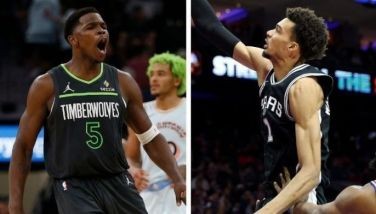Case of player trafficking

There had to be something philosophically or morally wrong as Qatar was able to enlist three Bosnians to play for the national team against the Philippines at the FIBA Asia/Oceania World Cup Qualifiers in Doha last Thursday, considering the rule is a national team is allowed to recruit only one naturalized player.
The three Bosnians were Emir Mujkic, Faris Avdic and Nedim Muslic. They’re three of nine Bosnian youngsters who were plucked out of their country and given Qatari passports in 2014 before they turned 16. FIBA allows foreigners to play for a country without limit if they received their passports before turning 16, regardless of heritage. The trafficking of youth to play basketball for a national team at a price may be a subject for human rights activists to study.
Qatar also recruited teenagers from Senegal in 2014 and made them citizens before turning 16 to comply with FIBA’s eligibility rule. In effect, it’s possible for a national team to submit a lineup of 12 foreigners or imports without any ethnic link to the country for as long as they received their passports before turning 16. It’s a rule that certainly deserves a revisiting.
At the same time, FIBA requires a player with dual citizenship and heritage to show a passport before turning 16 to be eligible as a native or local of the country where he wasn’t born. Otherwise, he will be considered a naturalized citizen. That’s the reason why Fil-foreigners like Jordan Clarkson, Christian Standhardinger, Stanley Pringle, Chris Newsome, Mo Tautuaa and others aren’t recognized as locals by FIBA and can only play for the Philippines under the naturalization rule.
FIBA used to allow two naturalized players for each national team. In 1986, the Philippines won its last FIBA Asia (then known as ABC or Asian Basketball Confederation) title with two naturalized players Jeff Moore and Dennis Still. The rule is different in non-FIBA sanctioned tournaments like the Jones Cup and the Asian Games. So that’s why in 1985, the Philippines won the Jones Cup with three naturalized players Moore, Still and Chip Engelland. It’s also why last year, Clarkson, Standhardinger and Pringle played together for the Philippines at the Asian Games.
Employing naturalized imports to reinforce a national team wasn’t a Philippine invention. It was done decades ago when Spain brought in Cliff Luyk and Wayne Brabender from the US then Antonio Sibilio of the Dominican Republic and Juan Domingo de la Cruz of Argentina. Australia took in Rocky Crosswhite who played for Davidson, Steph Curry’s alma mater. Israel, the US (with Pat Ewing from Jamaica and Hakeem Olajuwon from Nigeria) and France were other countries that enlisted naturalized players to beef up their national squads. In drafting Moore and Still, the Philippines simply applied a rule that was allowed by FIBA. Eventually, FIBA limited the recruitment of a naturalized player to one for each national team.
Last year, the late FIBA secretary-general Patrick Baumann considered bringing back the limit to two because in the combined Asia/Oceania zone, it would be difficult for Asian countries to topple Oceania powerhouses Australia and New Zealand. But SBP chairman emeritus and FIBA Central Committee member Manny V. Pangilinan said if FIBA would only allow players of heritage to suit up for the country of their choice, regardless of where they were born or when they were issued their passports, it wouldn’t be necessary to return the limit to two.
SBP special assistant to the president Ryan Gregorio said when Qatar submitted its lineup during the team managers meeting the day before the Gilas game, the three Bosnians stood out as foreigners but the Philippines didn’t protest. “We didn’t dwell on the Bosnians,” he said. “As far as we were concerned, they passed the eligibility requirements of FIBA. Our focus was to win the game, nothing else.”
Unfortunately, for Qatar, the three Bosnians are not high-caliber players. But what if they were? What if Qatar qualified for the World Cup and the three Bosnians played a major role in making it happen? Would there be a howl of protest from countries that were prejudiced by their presence?
Surely, it’s time to point out to FIBA that the under-16 rule has to be rethought. A former national coach described it a “lazy” rule because it spares FIBA from digging deeper into a player’s roots. The rule should be a national team must be allowed to enlist only one foreigner, a naturalized citizen, with no heritage or blood link to the country he is playing for.
It would be tragically ironic if a national team was composed of foreigners with no heritage but with passports showing they were issued before the imports turned 16. The rule should also allow a national team to enlist a foreign-born player with confirmed heritage or blood link to the country as a local or native regardless of when he received his passport. Confirmation of heritage of blood link may be by documentation or DNA testing.
Under Philippine law, a Fil-foreigner has the rights and privileges of a native or local for as long as a parent is Filipino, no matter where he was born. That means legally, a Fil-foreigner has the right and privilege to represent the Philippines in an international sporting competition. In effect, the FIBA prohibition goes against Philippine law and should therefore be aligned to what is allowed by the Philippine Constitution. If it isn’t aligned, and it isn’t now, the FIBA rule could be brought to the attention of the Court of Arbitration for Sport and players disenfranchised by the prohibition could seek redress.
- Latest
- Trending































